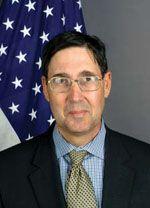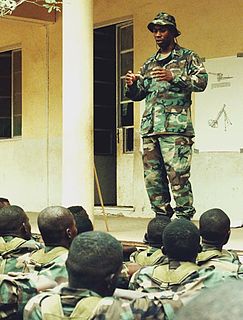
National security, or national defence, is the security and defence of a sovereign state, including its citizens, economy, and institutions, which is regarded as a duty of government. Originally conceived as protection against military attack, national security is widely understood to include also non-military dimensions, including the security from terrorism, minimization of crime, economic security, energy security, environmental security, food security, and cyber-security. Similarly, national security risks include, in addition to the actions of other nation states, action by violent non-state actors, by narcotic cartels, and by multinational corporations, and also the effects of natural disasters.

A low-intensity conflict (LIC) is a military conflict, usually localised, between two or more state or non-state groups which is below the intensity of conventional war. It involves the state's use of military forces applied selectively and with restraint to enforce compliance with its policies or objectives.

Unconventional warfare (UW) is broadly defined as "military and quasi-military operations other than conventional warfare" and may use covert forces, subversion, or guerrilla warfare. This is typically done to avoid escalation into conventional warfare as well as international conventions.

A Provincial Reconstruction Team (PRT) was a unit introduced by the United States government, consisting of military officers, diplomats, and reconstruction subject matter experts, working to support reconstruction efforts in unstable states. PRTs were first established in Afghanistan in early 2002, and were used in Iraq as well. While the concepts are similar, PRTs in Afghanistan and Iraq had separate compositions and missions. Their common purpose, however, was to empower local governments to govern their constituents more effectively.
An insurgency is a violent, armed rebellion against authority waged by small, lightly armed bands who practice guerrilla warfare from primarily rural base areas. The key descriptive feature of insurgency is its asymmetric nature: small irregular forces face a large, well-equipped, regular military force state adversary. Due to this asymmetry, insurgents avoid large-scale direct battles, opting instead to blend in with the civilian population where they gradually expand territorial control and military forces. Insurgency frequently hinges on control of and collaboration with local populations.

The United States Department of Defense Office of Force Transformation (OFT) was established October 29, 2001 in the Office of the Secretary of Defense. Secretary of Defense Donald Rumsfeld called for the creation of this new office to support his transformation vision along with President George W. Bush’s broad mandate to transform U.S. military capabilities. The transformation process intends to challenge the status quo with new concepts for American defense to ensure an overwhelming and continuing competitive advantage. The Director, Force Transformation serves as advocate, focal point, and catalyst for transformation among the Department, reporting directly to the Secretary and Deputy Secretary of Defense.
Network-centric warfare, also called network-centric operations or net-centric warfare, is a military doctrine or theory of war that seeks to translate an information advantage, enabled in part by information technology, into a competitive advantage through the robust computer networking of well informed geographically dispersed forces. It was pioneered by the United States Department of Defense in the 1990s.
Civil Affairs (CA) is a term used by both the United Nations and by military institutions, but for different purposes in each case.

Counterinsurgency (COIN) is "the totality of actions aimed at defeating irregular forces". The Oxford English Dictionary defines counterinsurgency as any "military or political action taken against the activities of guerrillas or revolutionaries" and can be considered war by a state against a non-state adversary. Insurgency and counterinsurgency campaigns have been waged since ancient history. However, modern thinking on counterinsurgency was developed during decolonization. Within the military sciences, counterinsurgency is one of the main operational approaches of irregular warfare.

John Edward Herbst is a retired American diplomat who was the United States Ambassador to Uzbekistan from 2000 to 2003 and United States Ambassador to Ukraine from September 2003 to May 2006.
Intelligence cycle management refers to the overall activity of guiding the intelligence cycle, which is a set of processes used to provide decision-useful information (intelligence) to leaders. The cycle consists of several processes, including planning and direction, collection, processing and exploitation, analysis and production, and dissemination and integration. The related field of counterintelligence is tasked with impeding the intelligence efforts of others. Intelligence organizations are not infallible but, when properly managed and tasked, can be among the most valuable tools of management and government.

Foreign internal defense (FID) is a term used by the military in several countries, including the United States, France, and the United Kingdom, to describe an integrated and multi-country approach to combat insurgency in a foreign state. This foreign state is known as the Host Nation (HN) under the US doctrine. The term counter-insurgency is more commonly used worldwide than FID.
Irregular warfare (IW) is defined in United States joint doctrine as "a violent struggle among state and non-state actors for legitimacy and influence over the relevant populations." Concepts associated with irregular warfare are older than the term itself.

The Civilian Response Corps is a program of the United States Department of State, Office of the Coordinator for Reconstruction and Stabilization (S/CRS). The Civilian Response Corps is currently a group of federal employees and volunteers from the private sector, state and local governments who are trained to deploy rapidly in countries that are in crisis or emerging from conflict in order to provide reconstruction and stabilization assistance. They are diplomats, development specialists, public health officials, law enforcement, corrections officers, engineers, economists, lawyers, public administrators, agronomists and others – offering the full range of skills needed to help fragile states in order to restore the stability and rule of law to achieve economic recovery and sustainable growth.
Hybrid warfare is a theory of military strategy, first proposed by Frank Hoffman, which employs political warfare and blends conventional warfare, irregular warfare, and cyberwarfare with other influencing methods, such as fake news, diplomacy, lawfare and foreign electoral intervention. By combining kinetic operations with subversive efforts, the aggressor intends to avoid attribution or retribution. The concept of hybrid warfare has been criticized by a number of academics and practitioners due to its alleged vagueness, its disputed constitutive elements, and its alleged historical distortions.
Informatized warfare of China is the implementation of information warfare (IW) within the People's Liberation Army (PLA) and other organizations of the Chinese Communist Party (CCP). Laid out in the Chinese Defence White Paper of 2008, informatized warfare includes the utilization of information-based weapons and forces, including battlefield management systems, precision-strike capabilities, and technology-assisted command and control (C4ISR). However, some media and analyst report also uses the term to describe the political and espionage effort from the Chinese state.
The following outline is provided as an overview of and topical guide to war:
Expeditionary economics is an emerging field of economic enquiry that focuses on the rebuilding and reconstructing of economies in post-conflict nations and providing support to disaster-struck nations.

Political warfare is the use of political means to compel an opponent to do one's will, based on hostile intent. The term political describes the calculated interaction between a government and a target audience, including another state's government, military, and/or general population. Governments use a variety of techniques to coerce certain actions, thereby gaining relative advantage over an opponent. The techniques include propaganda and psychological operations ("PsyOps"), which service national and military objectives respectively. Propaganda has many aspects and a hostile and coercive political purpose. Psychological operations are for strategic and tactical military objectives and may be intended for hostile military and civilian populations.

Security Force Assistance (SFA) is the strategic-level military practice of a donor country creating, equipping, training, advising, and supporting one or more groups of a foreign host country, such as a military, police, paramilitary, coast guard, intelligence organization, border police, etc, which contribute to the national security of the host country. SFA is used when improving the security of the host country aligns with the national interests of the donor country. It may be used alongside or instead of larger commitments of the donor country's military personnel and matériel. This means SFA can provide an alternative to large-scale operations if a war becomes controversial or politically difficult.










